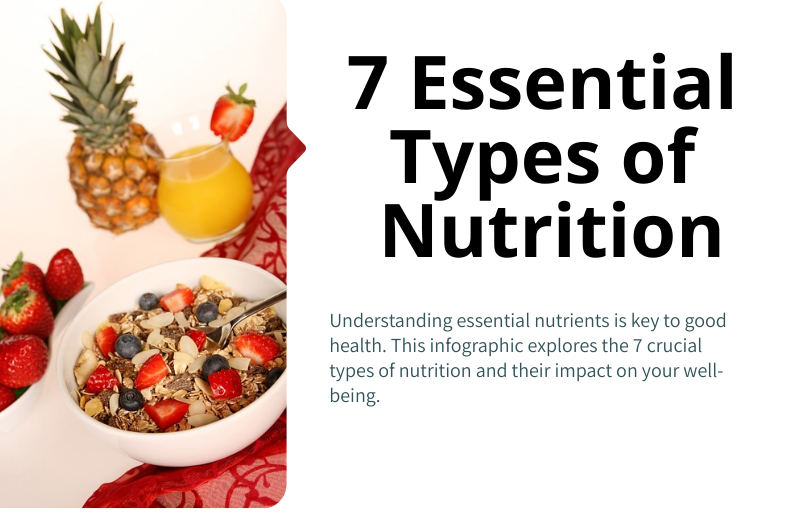Types of Nutrition and Nutrients-
Understanding Types of Nutrition and Nutrients can be hard to handle with all the information available. However, grasping the essentials is crucial for anyone looking to improve their health and fitness. This blog post on Types of Nutrition and Nutrients will break down the seven essential types of nutrition you need to know, using the PAS (Problem-Agitate-Solution) framework to ensure clarity and engagement.
Problem: The Confusion Around Nutrition

Nutrition is fundamental to our health, but the vast amount of information can be confusing. Many people struggle with understanding what their bodies need to function optimally. False belief about different nutrients can lead to poor dietary choices, resulting in health issues like obesity, malnutrition, and chronic diseases.
Frustrate: The Consequences of Poor Nutrition
Poor nutrition isn’t just about eating too much junk food; it’s also about not getting enough of the right nutrients. This can lead to a host of problems, including:
Chronic diseases: Conditions such as heart disease, diabetes, and certain cancers are linked to poor dietary habits.
Obesity and overweight: Excessive calorie intake without proper nutrients can lead to weight gain and related health issues.
Malnutrition: Not getting enough essential nutrients can cause deficiencies, affecting overall health and well-being.
Decreased energy levels: Inadequate nutrition can lead to fatigue and reduced productivity.
Impaired cognitive function: Proper nutrition is crucial for brain health and cognitive function.
Solution: Understanding the 7 Essential Types of Nutrition

Types of Nutrition and Nutrients..
To combat these issues, it’s vital to understand the 7 essential types of nutrition. Each type plays a unique role in our health and well-being. Here’s a comprehensive look at each one: (Types of Nutrition and Nutrients)
1. Carbohydrates

Carbohydrates (Types of Nutrition and Nutrients)
What They Are: Carbohydrates are one of the primary sources of energy for our bodies. They are found in foods like fruits, vegetables, grains, and legumes.
Why They’re Essential: Carbohydrates are broken down into glucose, which is used by our cells for energy. They are especially important for brain function and physical activity.
Case Study: A study published in the American Journal of Clinical Nutrition found that a diet high in whole grains, which are rich in complex carbohydrates, was associated with a reduced risk of cardiovascular disease. This highlights the importance of choosing the right types of carbohydrates for long-term health.
Types:
Simple Carbohydrates: Found in sugary foods and drinks. They provide quick energy but can lead to spikes in blood sugar levels.
Complex Carbohydrates: Found in whole grains, legumes, and vegetables. They provide sustained energy and are packed with fiber.
2. Proteins

What They Are: Proteins are made up of amino acids, which are the building blocks of our cells and tissues. They are found in foods like meat, dairy, beans, and nuts.
Why They’re Essential: Proteins are crucial for growth, repair, and maintenance of body tissues. They also play a vital role in enzyme and hormone production.
Case Study: Research in the Journal of Nutrition revealed that a higher protein intake is associated with improved muscle mass and strength in older adults. This underscores the importance of protein for maintaining muscle health as we age.
Types:
Complete Proteins: Contain all essential amino acids. Found in animal products and some plant sources like quinoa and soy.
Incomplete Proteins: Lack one or more essential amino acids. Found in most plant foods but can be combined to make complete proteins.
3. Fats

What They Are: Fats are a concentrated source of energy and are essential for various bodily functions. They are found in oils, butter, avocados, nuts, and fatty fish.
Why They’re Essential: Fats support cell growth, protect organs, and help absorb fat-soluble vitamins. They also provide long-lasting energy and play a role in brain health.
Case Study: The Mediterranean diet, which is high in healthy fats like olive oil and nuts, has been extensively studied. Findings published in the New England Journal of Medicine showed that this diet significantly reduces the risk of heart disease, demonstrating the benefits of healthy fats.
Types:
Saturated Fats: Found in animal products and some plant oils. Should be consumed in moderation.
Unsaturated Fats: Found in olive oil, avocados, and fatty fish. Known for their heart health benefits.
Trans Fats: Found in processed foods. Should be avoided due to their negative impact on heart health.
4. Vitamins

What They Are: Vitamins are organic compounds that our bodies need in small amounts to function properly. They are found in a variety of foods, including fruits, vegetables, and animal products.
Why They’re Essential: Vitamins are crucial for various bodily functions, including immune system support, energy production, and bone health.
Case Study: A study in the Journal of the American Medical Association found that vitamin D supplementation in older adults reduced the risk of fractures, highlighting the importance of adequate vitamin intake for bone health.
Types:
Water-Soluble Vitamins: Include vitamin C and the B-vitamins. They need to be consumed regularly as they are not stored in the body.
Fat-Soluble Vitamins: Include vitamins A, D, E, and K. These can be stored in the body and are essential for various functions, including vision and immune health.
5. Minerals

What They Are: Minerals are inorganic elements found in soil and water, which are absorbed by plants and animals. They are essential for various bodily functions.
Why They’re Essential: Minerals are vital for bone health, nerve function, muscle contraction, and cardiovascular health.
Case Study: Research published in the journal Nutrition Reviews indicated that adequate calcium and magnesium intake is associated with a reduced risk of developing metabolic syndrome, underscoring the importance of these minerals in maintaining metabolic health.
Types:
Macrominerals: Needed in larger amounts. Include calcium, phosphorus, magnesium, sodium, potassium, chloride, and sulfur.
Trace Minerals: Needed in smaller amounts. Include iron, manganese, copper, iodine, zinc, cobalt, fluoride, and selenium.
6. Water

Why It’s Essential: Water is crucial for maintaining the balance of bodily fluids, regulating temperature, and facilitating digestion and nutrient absorption.
Case Study: A study in the journal Obesity found that increasing water intake can aid weight loss by promoting satiety and reducing overall calorie intake. This demonstrates the importance of adequate hydration in weight management.
Benefits:
Hydration: Maintains fluid balance, which is critical for all bodily functions.
Detoxification: Helps flush out toxins from the body.
Digestion: Aids in the digestion and absorption of nutrients.
7. Fiber

What It Is: Fiber is a type of carbohydrate that the body cannot digest. It is found in plant-based foods like fruits, vegetables, grains, and legumes.
Why It’s Essential: Fiber is crucial for digestive health, helping to prevent constipation and promoting regular bowel movements. It also plays a role in controlling blood sugar levels and reducing cholesterol.
Case Study: A study in the Lancet found that a high-fiber diet was associated with a lower risk of developing chronic diseases, including coronary heart disease, stroke, type 2 diabetes, and colorectal cancer. This highlights the broad health benefits of dietary fiber.
Types:
Soluble Fiber: Dissolves in water and can help lower glucose levels and blood cholesterol. Found in oats, beans, and some fruits.
Insoluble Fiber: Does not dissolve in water and helps food move through the digestive system. Found in whole grains, nuts, and vegetables.
Conclusion
Understanding the 7 essential Types of Nutrition and Nutrients is the first step towards making better dietary choices and improving overall health. Each type of nutrient plays a unique role in our bodies, and a balanced diet that includes all these nutrients can help prevent chronic diseases, maintain a healthy weight, and promote overall well-being.
By focusing on a balanced intake of carbohydrates, proteins, fats, vitamins, minerals, water, and fiber, you can ensure your body gets the nutrients it needs to function optimally. Make informed choices, stay hydrated, and remember that a healthy diet is a cornerstone of a healthy life.(Types of Nutrition and Nutrients )
Call to Action
If you’re ready to take control of your nutrition and improve your health, start by evaluating your current diet. Identify areas where you can make healthier choices and incorporate a variety of nutrient-rich foods. Remember, small changes can lead to significant improvements over time. Stay informed, stay motivated, and take the first step towards a healthier you today. (Types of Nutrition and Nutrients). Read More..

